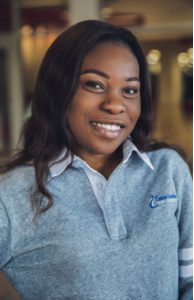“Remind them that they’re just like any other kid, that they’re not different just because they came from somewhere else.”
Related pages
Ruth Nyemba Muamba is a 16-year-old Congolese who left her country one July morning a year-and-a-half ago with her mother, two brothers, and sister.
She feels that emigrating to Montreal has given her a chance to lead a meaningful life—a chance she likely would not have had in her native Congo, a country in the midst of violent conflict.
“I want a good career, to be a woman of values, to be respected.”
Ruth, how long have you been in Montreal, and why did your family emigrate here?
There’s a lot of violence and suffering in our native Congo. There isn’t enough to go around, so people mistreat each other. Some want to impose their rules on others, but there’s resistance to that, so there’s a lot of fighting. And the government doesn’t do anything to stop it.
I arrived here a year-and-a-half ago with my mother, my two brothers, and my sister. My mother’s husband lives here, so he sponsored us. My father is still in the Congo, and it’s not easy to stay in contact with him under the circumstances.
How did you react when you learned you were leaving your country?
I didn’t want to leave! I was leaving everything behind, my friends, my school, my activities outside of school. It’s hard enough to abandon everything you’ve ever known, but on top of that, you find yourself in a foreign country where you don’t know anyone.
Tell me about the day you left the Congo to come here.
There were tearful goodbyes with my friends and people from the neighbourhood. The night before we left, we slept at my uncle’s place. My father picked us up in the middle of the night because we had to be at the airport at 4 a.m. He stayed with us a long time, because we wouldn’t be seeing him again for a while. I was sad and lonely on the plane. I missed my friends already. But at least I was with my family.
We got to Montreal around 11 on a July evening. The first morning, everything was strange. There was no noise in the building where we were staying. It was so quiet compared to my life in Kinshasa! And everyone was busy except us; we had nothing to do. I didn’t have a phone, and I was bored. My brothers and sister kept me company.
What happened next? How did you adapt to your new life?
Well, I spent a month doing practically nothing. We looked for a neighbourhood school to register me in. And then I was lucky enough to meet a French girl of Congolese origin at the church where my aunt prays. So I finally had someone to talk to! We spent all our time together, and she showed me the city. She helped me feel less alone.
When school started, I passed my entrance exams and was able to enter Calixa-Lavallée school. I was completely lost at first. We don’t have big schools like that in my country, with lots of students. And because everyone already had their own social group, it was hard to make friends.
Then one day, an African girl came up to me in the cafeteria and asked me a question. That gave me a chance to get to know her a little. And then I started making other friends, especially African girls, because they were easier to get along with. It was a bit strange to hang out with people from France, Mexico, or Columbia. I had only ever known other Congolese before.
I had trouble finding my bearings at first. And because of the accent, I had trouble understanding the teacher. The other thing that bothered me was that I’d always be forgetting my stuff. We don’t use binders in my country, so it took me a while to get used to bringing everything I need with me to school every day.
Now, after a year-and-a-half, I’d say it’s going a lot better. My French teacher suggested that I enter a contest for a Desjardins scholarship, which I won, and I got a chance to meet the Minister of Education and Higher Education. And I won a perseverance award at my school and played on the Spartiates soccer team. That’s how I started to get known in the school.
What do you like best about your new life in Montreal?
So many things. First, here, no one stops me from doing things. I mean, in Québec, everyone has a chance to become someone. I can get a really good job. And in my everyday life, if I want to go to the park, I can just go. In the Congo, not everyone can just go and do what they want.
At school, if you don’t understand something, you can ask for help and there are people who will help you. Where I came from, if you don’t understand, just too bad; either you’ll be ignored, or you’ll be beaten and mistreated. It’s the law of the strongest. Here, adults speak to children as if we were friends.
So all in all, I’m super happy here. My friends tell me about everything going on in the Congo. They talk about victims and death; maybe if I were there, I’d be a victim too. I’m lucky.
Can you relate a situation that has made you laugh since you’ve arrived in Montreal?
I was walking with a group of people and when we arrived at the corner, they stopped walking because the light was red! I wondered why we had stopped, because in my country, people never follow the traffic signals; it’s complete chaos. I found that really strange and funny!
What’s your biggest dream? What life do you want to lead in Québec?
I want to work hard to become someone. I like doing things on my own, being independent, having my own place and living alone, becoming a kind of role model for others. Right now, I work at McDonalds, mostly in the kitchen—I don’t like working the till, there are so many people it makes me dizzy—but eventually, I’d like to continue my education to work in the beauty industry, because I love beauty products. I’d also like to become a nutritionist, to give people advice about what to eat. Like what kinds of foods to eat to fight disease. I want a good career, to be a woman of values, to be respected.
What advice would you give a young person who has arrived from somewhere else, like you?
Never forget that here, there’s always someone who can help you. I’d also tell them that school is super important and to listen to their teachers; they’re our models.
In closing, what would you tell people who work with students from immigrant backgrounds, like yourself?
Always be encouraging so that these students feel like they’re capable of great things. And remind them that they’re just like any other kid, that they’re not different just because they came from somewhere else.
Ruth Nyemba Muamba
November 2019
 Photo and interview: François Couture
Photo and interview: François Couture
To better understand their unique circumstances, we asked writer and photographer François Couture to meet with young immigrants who were willing to talk about their backgrounds, their experience, and their arrival in Montreal.





